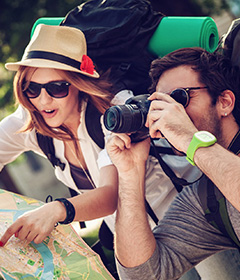Travel has long been celebrated as a transformative experience, offering opportunities for personal growth and cultural enrichment. Yet, many travellers fall into the trap of adhering to familiar routines, even when exploring new destinations. Breaking free from these habitual patterns can significantly enhance the quality and impact of your travel adventures. By embracing novelty and spontaneity, travellers can unlock a wealth of psychological benefits, cultural insights, and memorable experiences that might otherwise remain undiscovered.
Neuroplasticity and travel: rewiring the brain through novel experiences
The concept of neuroplasticity—the brain’s ability to form new neural connections throughout life—plays a crucial role in understanding how travel can impact cognitive function. When we expose ourselves to new environments, cultures, and experiences, our brains are challenged to create fresh neural pathways. This process of neural rewiring can lead to enhanced cognitive flexibility, improved problem-solving skills, and a broadened perspective on the world.
Research has shown that novel experiences stimulate the release of neurotransmitters such as dopamine and norepinephrine, which are associated with learning and memory formation. By consistently seeking out new and unfamiliar situations during travel, we can effectively exercise our brains, promoting cognitive health and potentially reducing the risk of age-related cognitive decline.
Moreover, the act of navigating unfamiliar territories—whether it’s deciphering a foreign subway map or communicating in a new language—engages multiple regions of the brain simultaneously. This mental engagement can lead to improved spatial awareness, language acquisition skills, and overall cognitive agility.
Comfort zone disruption: psychological benefits of travel unpredictability
While routines provide a sense of security and efficiency in daily life, they can also limit personal growth and experiential richness. Travel offers a unique opportunity to disrupt these comfort zones, leading to a range of psychological benefits that extend far beyond the duration of the trip itself.
Stress inoculation theory in unfamiliar travel scenarios
The Stress Inoculation Theory posits that exposure to moderate levels of stress can increase an individual’s resilience to future stressors. In the context of travel, encountering and overcoming unfamiliar challenges—such as navigating a foreign city or communicating across language barriers—can serve as a form of stress inoculation . This process helps travellers build confidence and adaptability, skills that prove valuable not only in future travel scenarios but also in everyday life.
Cognitive flexibility enhancement through varied cultural interactions
Engaging with diverse cultures and perspectives during travel can significantly enhance cognitive flexibility—the ability to adapt thinking and behaviour in response to new situations. By immersing oneself in different cultural contexts, travellers are forced to reassess their own assumptions and worldviews, leading to more open-minded and adaptable thought processes.
Self-efficacy boost from overcoming travel challenges
Successfully navigating the unpredictable aspects of travel can provide a substantial boost to one’s sense of self-efficacy—the belief in one’s ability to handle future challenges. Whether it’s finding alternative accommodation after a cancelled booking or successfully haggling in a local market, these experiences contribute to a traveller’s confidence and problem-solving abilities.
Dopamine release patterns in novel vs. routine travel activities
The brain’s reward system, primarily driven by dopamine release, responds more strongly to novel experiences than to routine activities. This neurochemical response explains why breaking away from familiar travel patterns can lead to more vivid and memorable experiences. By consciously seeking out new activities and environments, travellers can maximise the psychological rewards of their adventures.
Serendipitous discovery: the art of unplanned travel itineraries
One of the most rewarding aspects of breaking travel routines is the opportunity for serendipitous discovery. By leaving room for spontaneity and unplanned exploration, travellers open themselves up to unique experiences and connections that rigid itineraries might preclude.
Psychogeography and dérive techniques for urban exploration
Psychogeography, a concept developed by the Situationist International movement, encourages individuals to explore urban environments in non-traditional ways. The technique of dérive , or “drifting,” involves wandering through a city without a predetermined route, allowing the atmosphere and architecture to guide one’s journey. This approach can lead to discovering hidden gems, local haunts, and authentic cultural experiences that guidebooks often overlook.
Slow travel philosophy: immersion vs. checklist tourism
The slow travel movement emphasises quality over quantity, encouraging travellers to spend extended periods in fewer locations rather than rushing through a checklist of tourist attractions. This approach allows for deeper cultural immersion, meaningful local connections, and a more nuanced understanding of the destination. By breaking away from the conventional “must-see” mentality, slow travellers often report more satisfying and transformative experiences.
Local interaction maximization through spontaneous Decision-Making
Spontaneous decision-making during travel can lead to increased interactions with locals, often resulting in more authentic cultural exchanges. Whether it’s accepting an invitation to a family dinner or joining an impromptu street celebration, these unplanned encounters frequently become the most cherished memories of a trip.
Digital detox: embracing analog navigation and human connection
In an era of constant connectivity, deliberately disconnecting from digital devices during travel can lead to more immersive and mindful experiences. By relying on physical maps, local recommendations, and face-to-face interactions, travellers can rediscover the joy of analog exploration and deepen their engagement with their surroundings.
Studies have shown that excessive smartphone use during travel can detract from the overall experience, leading to decreased memory formation and reduced enjoyment. By implementing a digital detox , even for short periods, travellers can enhance their sensory awareness, improve their navigational skills, and foster more meaningful connections with both fellow travellers and locals.
Moreover, the act of getting lost and finding one’s way without digital assistance can be a valuable exercise in problem-solving and adaptability. These experiences often lead to unexpected discoveries and a sense of accomplishment that can boost confidence and self-reliance.
Culinary adventure: gastronomic exploration beyond comfort foods
Food plays a central role in cultural identity and can be one of the most direct ways to experience a new culture. Breaking away from familiar culinary routines and embracing local gastronomy can lead to a deeper understanding of a destination’s history, traditions, and social dynamics.
Engaging in culinary adventures, such as street food tours, cooking classes, or dining with locals, can provide insights into a culture that might otherwise remain inaccessible. These experiences not only expand one’s palate but also offer opportunities for cross-cultural communication and understanding.
Research has shown that trying new foods can stimulate the brain’s reward centres, leading to increased feelings of pleasure and novelty. This neurological response can enhance overall trip satisfaction and create lasting memories associated with specific flavours and dining experiences.
Accommodation experimentation: from couchsurfing to Eco-Lodges
Accommodation choices can significantly impact the nature of a travel experience. By breaking away from standard hotel stays and exploring alternative options, travellers can gain unique perspectives on local life and contribute to more sustainable tourism practices.
Couchsurfing, for example, offers the opportunity to stay with locals, providing an insider’s view of daily life and fostering cultural exchange. Eco-lodges and community-based tourism initiatives allow travellers to support local economies and environmental conservation efforts while enjoying immersive experiences in natural settings.
Experimenting with diverse accommodation types can also lead to unexpected social connections. Hostels, for instance, often facilitate interactions between travellers from various backgrounds, potentially leading to new friendships and collaborative travel experiences.
Furthermore, choosing unconventional accommodations can challenge preconceptions about comfort and luxury, encouraging travellers to reassess their priorities and appreciate different ways of living. This shift in perspective can be a valuable takeaway, influencing choices and attitudes long after the trip has ended.
By consciously breaking routines and embracing the unpredictable nature of travel, individuals can unlock a wealth of psychological, cultural, and personal benefits. From rewiring neural pathways to fostering cross-cultural understanding, the act of stepping outside one’s comfort zone during travel can lead to profound and lasting transformations. As the world becomes increasingly interconnected, the ability to adapt, empathise, and engage with diverse experiences becomes ever more valuable. Through mindful and adventurous travel practices, we can cultivate these skills while creating rich, meaningful memories that endure long after we’ve returned home.


